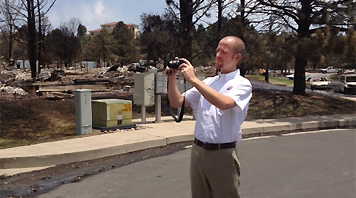|
RMIIA News Releases7951 E. Maplewood Avenue, Suite 110 Contact: Carole Walker, Executive Director Wild Weather Week: A Costly One for Colorado & Wyoming July 19, 2011 – Mother Nature wrecked havoc along the Front Range and south eastern Wyoming last week—again living up to the region's weather reputation as "hail alley." The hail that cut a swath through Colorado on Wednesday was accompanied by monsoonal rainfall that flooded streets and property on a daily basis. Cheyenne was ground zero for golf and tennis ball-sized hail on Monday evening that pounded vehicles and homes. The Rocky Mountain Insurance Information Association reports the insured damage to cars and homes in Colorado from last week's storms is estimated at $164.8 million as the result of approximately 29,800 claims—17,200 auto claims and 12,600 homeowners claims. The lion's share of the insured damage was due to the widespread hail that fell on Wednesday south from Fountain through the Denver metro area hitting Lakewood the hardest, along with significant damage reported in Loveland and Fort Collins. The large hail that rained down on Cheyenne Monday evening is estimated to have an insurance price tag of $120 million resulting from approximately 19,800 claims—15,200 auto claims and 4,600 homeowners claims. These are preliminary estimates and are subject to change as the claims process continues. Fortunately, homeowners insurance covers damage from wind and hail, and damage to vehicles from hail and flooding is covered if you carry comprehensive insurance on your auto policy. Some carriers have set up emergency drive up claims centers in the hardest hit areas to help speed up the claims process and take care of customers. "Mother Nature reminded us last week that severe weather season is still in full swing in the Rocky Mountain Region," says Carole Walker, executive director of the Rocky Mountain Insurance Information Association. "It's important for all of us to be talking to our insurance representatives to make sure we are protected and have the coverage we need—especially during these peak months for catastrophic weather." How to file an auto claim: How to file a property claim: Claims Filing Advice: The Rocky Mountain Insurance Information Association has this advice for affected residents filing claims for damage.
Tips for Hiring a Contractor: Hiring a reputable contractor to do repairs or construct a new home is critical. Word of mouth is still one of the best ways to choose a contractor. Also check with the area Better Business Bureau. Make certain they are licensed and have adequate insurance coverage. Don't become a victim of disaster fraud. After a natural disaster, professionals often go from door-to-door in damaged neighborhoods, offering clean up or repair services. Many of these business people are reputable. Others are not. The dishonest ones may pocket payment without completing the job or use inferior materials and perform shoddy work not up to code. Contractor Checklist:
Log on to www.rmiia.org for more information. ### Rocky Mountain Insurance Information Association is a non-profit consumer information organization. Affiliated with the Insurance Information Institute, RMIIA has been serving consumers and the media since 1952. |
|
303-790-0216 • 800-355-9524 • Contact Us • Legal Notice, Disclaimer & Terms of Use
Home • About RMIIA • News Room • P&C Insurance Industry • Auto • Homeowners • Business • Catastrophes • Agent Resources • Events & Education • Brochures

